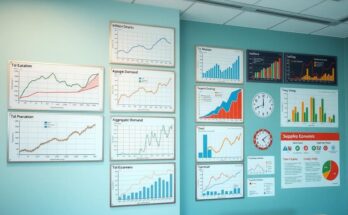Amid rising tariff concerns post-election, Colorado business owners Travis Campbell and Jason Sharpe fear the impact on costs and operations. With Trump proposing steep tariffs, small businesses may face catastrophic price hikes, impacting profitability and customer expenses—a reality underscored by economic forecasts warning of inflation and increased costs for American households.
In the picturesque regions of Colorado, business owners like Travis Campbell and Jason Sharpe watch the winds of political change with trepidation, particularly concerning trade policies that may emerge post-election. With Donald Trump advocating for steep tariffs, and Kamala Harris offering limited insight, anxiety looms. As Campbell, proprietor of Eagle Creek, articulates, increased tariffs could spell disaster, hiking prices on both ends – for businesses and consumers alike, making survival in competitive markets a daunting challenge. Sharpe, leading Namaste Solar, resonates with this sentiment, recalling the painful rise in prices when tariffs previously took effect. “As a small business, we’re in the middle. We’re halfway done with construction… the manufacturer just passes the tariff onto us,” he lamented, drawing attention to the harsh realities of inflation that directly impact customer wallets. Economists echo this sentiment, warning that the proposed tariffs could unleash a cascade of rising costs, with a potential $1,700 annual hit on middle-income families. Furthermore, the unexpected volatility in raw material prices can cripple small businesses that provide jobs and valuable services across the nation. As reflected in the words of Ken Simonson, chief economist for the Associated General Contractors of America, “To put it very simply, tariffs are taxes. Consumers are going to pay those in terms of products.” Campbell’s company, once thriving on predictable pricing, has felt the sting of the expired Generalized System of Preferences (GSP) program, losing the benefit of zero tariffs on key imports. “Like lots of manufacturers, that’s caused us to pass some of those costs onto our consumers,” he shared, underscoring how higher tariffs risk strangling profit margins and hampering future growth. As the outdoor industry collectively bears about $1.7 billion in tariffs, Kent Ebersole, president of the Outdoor Industry Association, implored for a return to bipartisan support. Businesses stand at a crossroad, apprehensively eyeing potential policy shifts that may reshape their futures and the economic landscape.
The backdrop of this narrative is the turbulent world of U.S. trade tariffs, particularly focusing on the potential economic implications stemming from the upcoming elections. With differing approaches from candidates Kamala Harris and Donald Trump, business leaders in Colorado voice their concerns over the impact of increased tariffs on their operations, consumers, and the broader economic picture. The fear is palpable; rising tariffs can trigger higher costs for consumers, lead to inflation, and adversely affect small businesses that are crucial to the economy.
As Colorado’s business landscape stands on the edge of uncertainty, the potential for increased tariffs creates a ripple effect that could profoundly alter the industry. Business owners are concerned that the ramifications of such policies will burden consumers, push up prices, and stall growth. The collective hope is that legislative choices will foster a balanced environment where businesses can thrive without the looming threat of exorbitant tariffs breaking their backs. The path forward is fraught with economic challenges, yet it calls for resilient strategies to safeguard the essence of American entrepreneurship.
Original Source: www.denverpost.com



